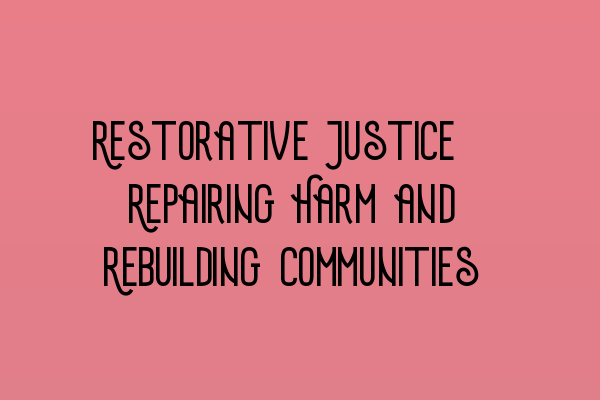Restorative Justice: Repairing Harm and Rebuilding Communities
Restorative Justice has gained significant attention in recent years as an alternative approach to criminal justice. It focuses on repairing the harm caused by crime and rebuilding communities, rather than solely punishing offenders. In this blog post, we will explore the principles of restorative justice, its benefits, and its application in the UK criminal law system.
Understanding Restorative Justice
Restorative justice is rooted in the belief that crime is more than just a violation of laws; it is also a violation of individuals and communities. The key idea behind restorative justice is to address the needs of all parties involved – the victim, the offender, and the community – and facilitate their active participation in the resolution process.
Unlike traditional punitive measures, restorative justice aims to create opportunities for dialogue, understanding, and reconciliation. It provides a platform for victims to express their pain and seek answers, for offenders to take responsibility for their actions, and for communities to heal from the harm caused by crime.
The Benefits of Restorative Justice
Restorative justice brings numerous benefits to all stakeholders involved. For victims, it offers a chance to be heard, to gain closure, and to seek emotional and material restitution. It empowers them by placing their needs at the center of the justice process.
For offenders, restorative justice provides an opportunity to face the consequences of their actions, make amends, and work towards personal transformation. By engaging with the harm they have caused, offenders can develop empathy and take steps to reintegrate into society.
Restorative justice also benefits communities by promoting accountability, reducing recidivism, and restoring trust. It fosters a sense of collective responsibility and encourages community members to actively participate in the healing process.
Implementing Restorative Justice in the UK
The UK has embraced restorative justice as an important tool in the criminal justice system. Various organizations and initiatives have been established to support the implementation of restorative justice practices across the country.
One notable example is the Restorative Justice Council (RJC), an independent nonprofit organization that sets standards for restorative practices and provides accreditation for practitioners. They offer training, resources, and support to professionals working in the field of restorative justice.
Restorative justice is employed in a wide range of criminal law matters, including minor offenses, serious crimes, and even pre-sentence restorative interventions. It can be utilized at various stages of the criminal justice process, from pre-trial to post-sentence, offering multiple opportunities for healing and resolution.
Conclusion
Restorative Justice is a transformative approach to crime and punishment. By focusing on repairing harm and rebuilding communities, it offers a more holistic and inclusive way to address the impact of crime. The principles of restorative justice align with the evolving needs and expectations of society, emphasizing empathy, accountability, and healing.
If you are interested in learning more about SQE criminal law and practice in the UK, check out our related articles:
